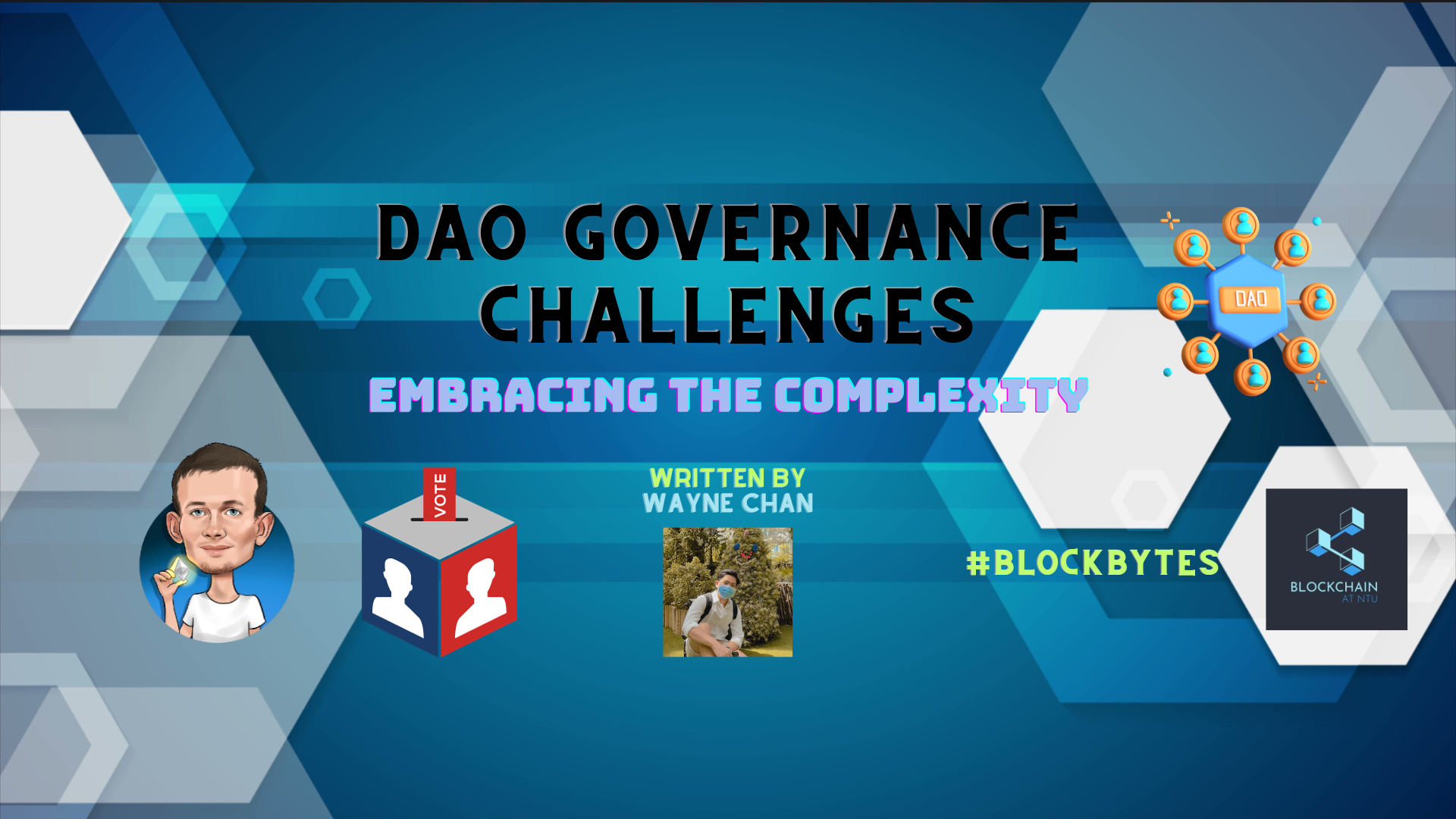
Block Bytes #2: DAO Governance Challenges: Embracing the Complexity
Decentralized Autonomous Organizations (DAOs) are pioneering decentralized governance, but they encounter intricate challenges. In this discussion on "DAO Governance Challenges: Embracing Complexity," we explore key issues that DAOs must navigate, highlighting the importance of addressing these complexities for their evolution and success.
Understanding DAOs

DAOs otherwise known as Decentralized Autonomous Organizations are digital organizations governed by smart contracts, rather than centralized authorities. DAOs use code to automate decision-making processes, financial transactions and resource allocation. They promise to enable trustless, transparent, and democratic decision-making, transforming the way organizations are run. However, as DAOs gain traction, they are confronted with a myriad of governance challenges that stem from the inherent complexity of their operations. In this article, we will explore the key challenges DAOs face and how embracing this complexity is essential for their success.
Smart Contract Vulnerabilities
One of the most significant challenges in DAO governance is the security of smart contracts. Smart contracts are the backbone of DAOs and they govern how DAOs function. Vulnerabilities in these smart contracts can lead to catastrophic consequences. One of the most infamous examples is “The DAO” exploit in 2016. By exploiting a loophole in the smart contract’s code, an attacker drained over 3.6 million Ether from The DAO, causing a contentious hard fork in the Ethereum network.
Token Voting Dynamics
Token-based voting is a common governance mechanism in DAOs. However, this approach presents several challenges. One problem is that this can lead to plutocracy, where those with more tokens have more voting power, potentially undermining the democratic ideals of DAOs.
a16z, a big investor in LayerZero Labs, used its voting power to stop a DAO proposal that wanted to bring Uniswap to Binance's blockchain via the Wormhole bridge. This event highlights concerns about anti-competitive behavior in the DeFi world, where some groups may work together to limit fair competition.
Voting Privacy
Ensuring private voting in any system, including DAOs, involves implementing cryptographic techniques to protect the anonymity of voters. One common approach is to use ZKPs (zero-knowledge proofs), which allow for the verification of votes without revealing individual choices. Additionally, decentralized identity solutions can help verify the eligibility of voters while keeping their identities private. It's essential to strike a balance between privacy and transparency, as overly private systems can raise concerns about fraud or manipulation. Effective implementation of these technologies can enable secure and private voting processes in DAOs and other contexts.
Embracing Complexity: Solutions and Innovations
Despite these challenges, DAOs continue to evolve, and many are actively working on solutions to address governance complexities.
Smart Contract Audits: To enhance security, DAOs are increasingly conducting thorough audits of their smart contracts by third-party experts to identify vulnerabilities and ensure robust code.
Tokenomics(Liquid Democracy): Liquid democracy in DAOs combines direct and delegated voting, enabling token holders to either vote directly or delegate their power to trusted individuals. This boosts participation and efficiency, catering to varying engagement levels. Experts can contribute on complex issues, improving decision-making. Overall, liquid democracy enhances adaptability and inclusivity in DAO governance.
ZKPs: Zero-Knowledge Proofs (ZKPs) offer an elegant solution to the challenge of privacy in DAO voting. By utilizing ZKPs, individuals can prove their eligibility to vote without revealing their specific choices. This cryptographic technique ensures that the voting process remains confidential, safeguarding voters from potential coercion or influence. ZKPs maintain the integrity of the vote while preserving anonymity, striking a delicate balance between privacy and transparency in DAO governance. This innovation not only enhances the security of the voting process but also encourages wider participation and trust within the DAO ecosystem.
Conclusion
DAO governance challenges are undeniably complex, but they are not insurmountable. Embracing this complexity is essential for the continued growth and success of DAOs. Through innovative solutions, improved security measures, and a commitment to decentralized principles, DAOs are poised to overcome these challenges and reshape the future of organizational governance. As they do, they will undoubtedly pave the way for a more democratic, transparent, and equitable world of decision-making and resource allocation.

We, from Blockchain at NTU, thank you for being part of this enlightening journey and extend a warm welcome to the enthralling universe of blockchain!
NOTE: Articles written by Blockchain at NTU ARE NOT FINANCIAL ADVICE!
Written By:
Wayne Chan
Researcher of Blockchain at NTU Club AY23/24
Social Media Links:
| Facebook | Instagram | Twitter | Linkedin | Discord |
| Telegram Group | Telegram Channel |


 6,407
6,407






